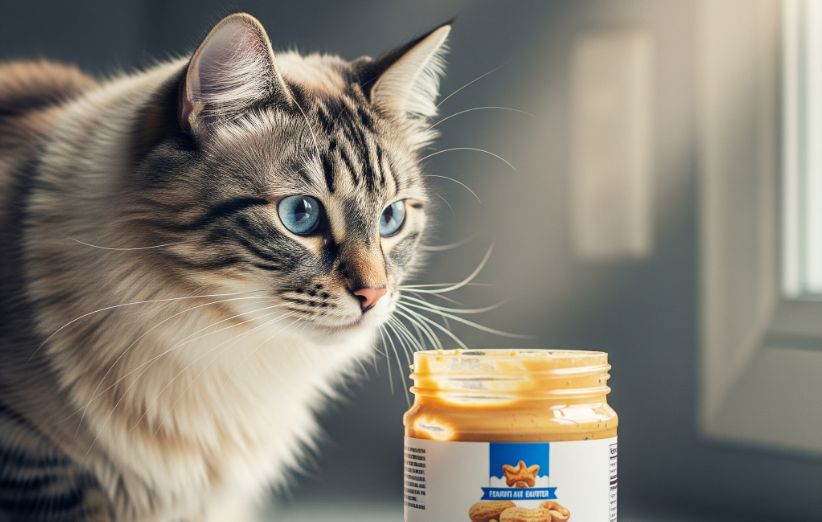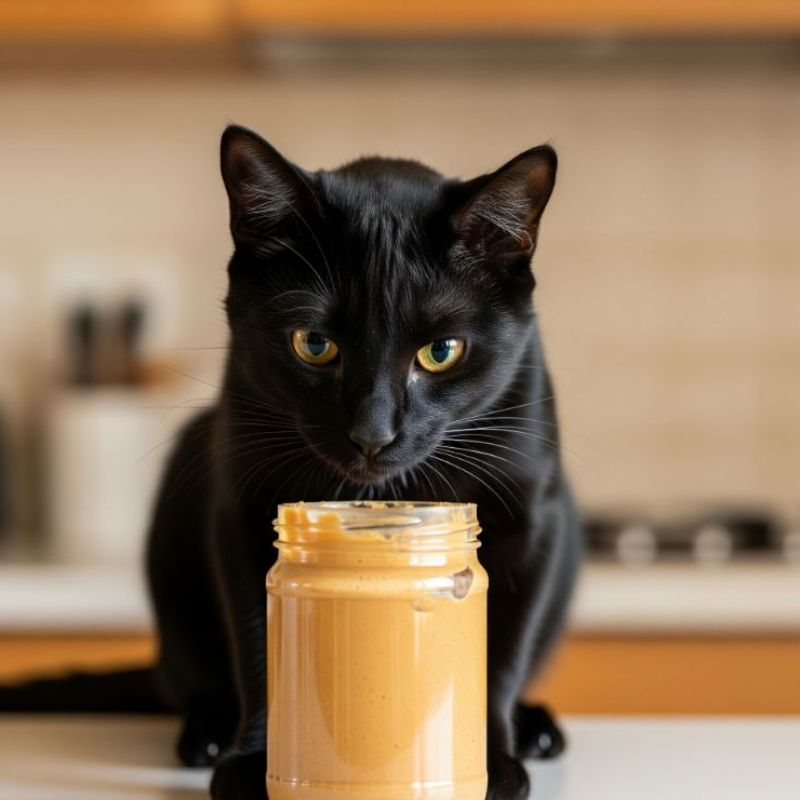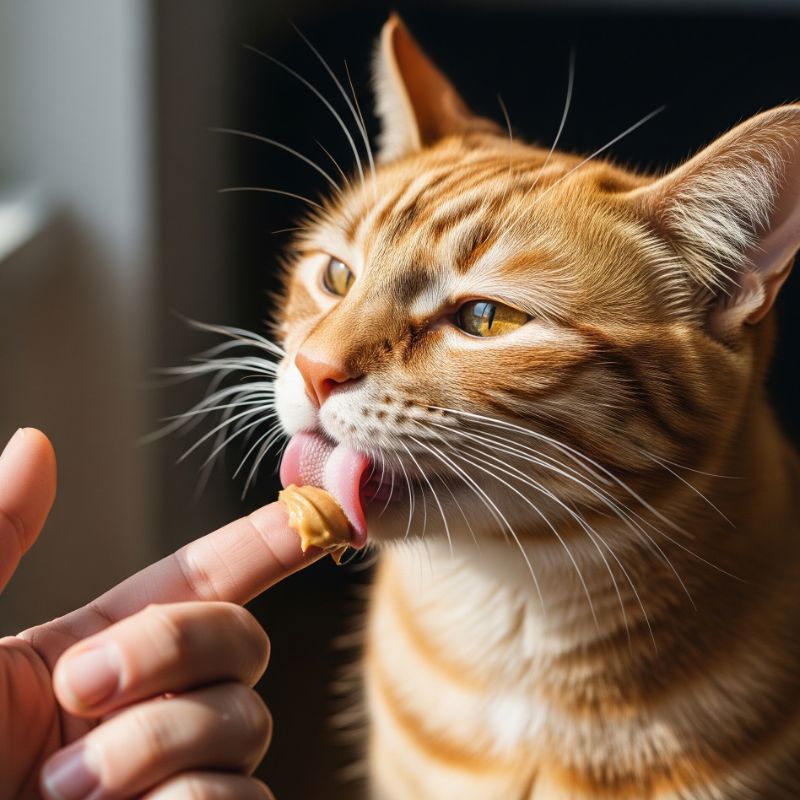Picture this: you’re relaxing on the couch, enjoying a delicious peanut butter sandwich, when suddenly a pair of curious eyes and twitching whiskers appear. Your cat is giving you that pleading look, begging for a taste of your snack. In this moment, a critical question comes to mind: can cats eat peanut butter? This isn’t just a matter of curiosity; it’s about the health and safety of your beloved pet. In this comprehensive article from petomiz, we’ll answer this question in full, exploring all the pros and cons.
Can Your Cat Eat Peanut Butter?
The short and direct answer is: yes, but only rarely and with extreme caution. Peanut butter itself is not toxic to cats, but it is by no means an ideal or healthy treat for them. While a tiny lick of natural, additive-free peanut butter probably won’t harm your cat, there are potential dangers that should not be ignored.
Why Can Peanut Butter Be Dangerous for Your Cat?
Before you share the peanut butter jar with your feline friend, you must be aware of the serious risks involved. These are not just recommendations; they are vital safety points to protect your cat’s health.
Xylitol: The Number One Enemy!
Many peanut butter brands, especially the “diet” or “sugar-free” varieties, use an artificial sweetener called xylitol. While safe for humans, xylitol is extremely toxic to many pets, including cats and dogs. Ingesting even a small amount can rapidly lead to a severe drop in blood sugar, liver failure, and even death. Always read the product label carefully!
High Fat and Digestive Problems
Peanut butter is very high in fat. A cat’s digestive system, being that of an obligate carnivore, is not designed to process this amount of fat. Consuming it can lead to:
- Stomach upset
- Diarrhea and vomiting
- In the long term, obesity and pancreatitis (a painful and serious inflammation of the pancreas).
Choking Hazard
The thick, sticky texture of peanut butter can easily get stuck in a cat’s mouth and throat, posing a serious choking hazard. This risk is especially significant for kittens and smaller cat breeds.
Pet owners sometimes mistakenly think human food is fine for their pets. While some foods are safe, others can be harmful. For example, while you might be curious about whether Can Cats Eat Bread?, you should know that dog food is never a suitable substitute for cat food, a topic we cover in our article Can Cats Eat Dog Food?.
Can cats eat peanut butter? A Guide to Safe Selection and Consumption
If, despite all the risks, you decide to give your cat a tiny amount of peanut butter, you must do so by following strict safety rules. Here is a complete guide for you.
- Check the Ingredients: The first and most important step is to ensure there is NO XYLITOL in the ingredients.
- Choose Natural: The best option is natural, organic, unsalted, and unsweetened peanut butter.
- A Very Small Amount: Give your cat no more than a pea-sized amount. This should not be a meal or even a full snack.
- Very Infrequent Treat: Make this a very rare occasion, not a daily or weekly habit.
| Feature | Safe Peanut Butter (For very limited use) | Unsafe Peanut Butter |
|---|---|---|
| Xylitol | Contains absolutely none | May contain it (Extremely dangerous) |
| Sugar & Salt | No added sugar or salt | Contains added sugar, salt, or corn syrup |
| Ingredients | Only peanuts (sometimes a little natural peanut oil) | Contains hydrogenated oils, preservatives, and flavors |
Healthier and Tastier Alternatives for Cats
Instead of peanut butter, why not use healthy, cat-specific treats? Cats enjoy meaty flavors. Small pieces of cooked chicken, fish, or high-quality commercial cat treats are much better options. Even some fruits can be beneficial in moderation. For example, you can read our articles on whether can cats eat blueberries? or Can Cats Eat Strawberries?. Of course, you must always be wary of toxic fruits like grapes, which is fully explained in the article can Cats Eat Grapes?. Even a summer fruit like watermelon has its own questions, which we answer in Can Cats Eat Watermelon?.
What Do Experts and Veterinarians Say?
To demonstrate Experience, Expertise, Authoritativeness, and Trustworthiness (E-E-A-T), it’s important to know the expert opinion. Most veterinarians and pet nutrition experts do not recommend giving peanut butter to cats. According to the experts at VCA Animal Hospitals, high-fat human foods can disrupt a cat’s nutritional balance and lead to health problems. As another authoritative source, PetMD, points out, the risks of peanut butter, including xylitol and high fat, far outweigh its negligible benefits for cats.
Final Conclusion
Ultimately, the answer to the key question “can cats eat peanut butter?” is a cautious “yes.” However, given the serious risks like xylitol poisoning, digestive issues, and the choking hazard versus almost zero nutritional value for your cat, our recommendation is to skip it. There are much healthier and safer alternatives to make your cat happy.
For more information on healthy cat nutrition and choosing the best for your furry friend, visit the petomiz website and follow our expert articles.
Frequently Asked Questions About Cats and Peanut Butter (FAQ)
1. What should I do if my cat accidentally eats peanut butter containing xylitol?
This is an emergency situation. Contact your veterinarian or an animal emergency center immediately and without any delay. Signs of xylitol poisoning can include vomiting, weakness, loss of coordination, and seizures, and require immediate medical attention.
2. Does peanut butter have any benefits for cats?
No. Cats are obligate carnivores and get all the nutrients they need from animal sources. Peanut butter offers no significant nutritional benefit for them, and its plant-based protein is not as useful to them as animal protein.
3. How much peanut butter is safe for a cat?
If you insist on giving your cat peanut butter, the amount should be no more than the size of a pea and should be given on very rare occasions (e.g., once every few months). Ensure the product is free of xylitol, salt, and sugar.



